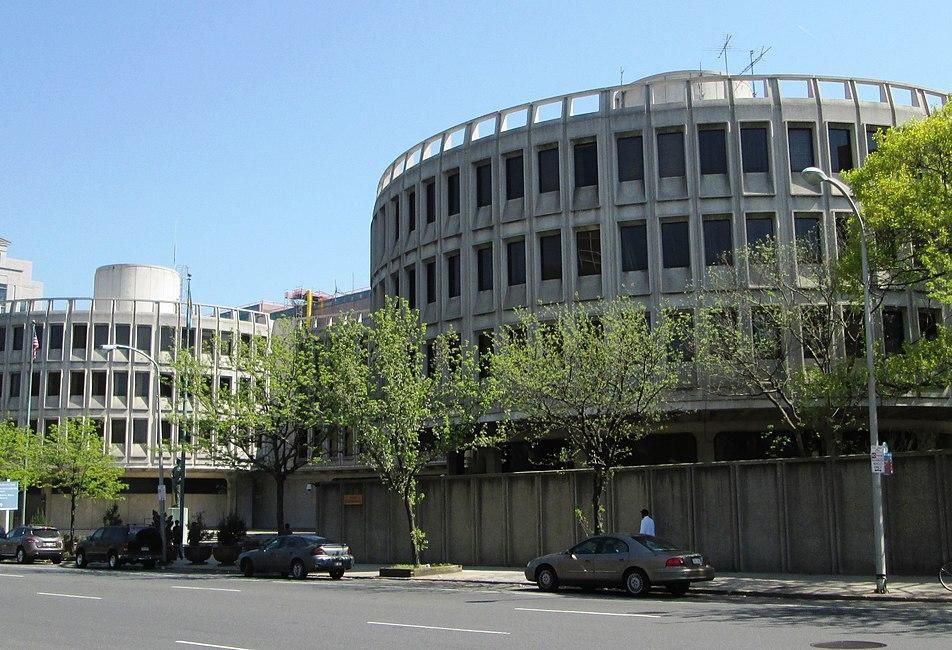The Philadelphia Police Department is moving into a new headquarters, leaving behind an iconic building laden with the weight of history and the question of what to do with it.

The Roundhouse building at Seventh and Race streets in Philadelphia, which served as headquarters of the Philadelphia Police Department until 2022
The Philadelphia Department of Planning and Development issued a request for proposals on Wednesday, seeking someone to lead the community engagement process for the eventual next life of the building known locally as the Roundhouse for its curved, quasi-brutalist style that resembles the shape of handcuffs. It will be the first time in memory that the city of Philadelphia seeks community input on a major redevelopment before issuing an RFP for developers, according to DPD spokesperson Paul Chrystie.
Since at least 1963, when PPD moved into the Roundhouse, local police have gained a reputation among Philadelphians of color for brutality, with notable examples being the leadership of Frank Rizzo, the MOVE bombing of 1985 and, more recently, the tear gassing of protestors demonstrating on Interstate 676 after the murder of George Floyd by a police officer in Minnesota. The resultant increase in general awareness of the effects of police violence informed the planning department’s decision to put community engagement first in determining the future of the Roundhouse.
“We wanted to signal to the community that we understand, based on what’s going on in America, abroad and in Philadelphia, that these are real issues that communities of color have borne the brunt of,” Philadelphia Deputy Director of Planning and Zoning Eleanor Sharpe told Bisnow. “So up front, we wanted to make sure that people know we see it, we understand it, but at the same time, it’s a piece of real estate the city has and needs to turn over and generate income.”
No plans of any kind have been made about the future of the Roundhouse, and Sharpe declined to even offer an opinion about the area around the building, which sits on Race Street between Seventh and Eighth streets, just southeast of the heart of Chinatown.
“I really want people not to have preconceptions about what this place could be,” Sharpe said. “What neighborhood it’s considered a part of could wind up being a factor going forward.”
Beyond the desire to keep a blank slate, the Roundhouse’s future will be a concern for much more than just the surrounding neighborhood.
“The fact that it’s the police headquarters rings bells across the city,” Sharpe said.

The former Philadelphia Inquirer headquarters building at 400 North Broad St., which became the headquarters of the Philadelphia Police Department in 2022.
Respondents to the RFP, which has a March 14 deadline for submissions, can come from any type of business background, in groups or as individuals, so long as they have some experience in the process of community engagement for real estate development. In a time when neighbors of new projects have become louder voices than ever in the planning process, how community engagement will even be conducted for the Roundhouse will be determined based on the results of the RFP.
Once an entity has been selected to lead the process, the planning department expects the actual community engagement to occur between May and October of this year, with a report released by the end of the year. Meanwhile, PPD is moving to its new home, the former headquarters of the Philadelphia Inquirer at 400 North Broad St. that Bart Blatstein redeveloped for the city, and is expected to complete the process by the end of the first quarter, Chrystie said.
“We don’t want to see this vacant for 10, 20 years,” Sharpe said. “We want to turn it over.”
Despite the open-ended nature of the engagement process, any plan for the Roundhouse will have to produce revenue for the city, whether in the form of a sale, lease or tax revenue, Sharpe said. The proceeds from a sale would assist the city in funding social programs — all of which have been affected by the pandemic. The financial requirement may prevent some community-supported uses for the property, but the engagement process isn’t meant to be determinative of the project’s direction.
“The reason why we want to hear from the general public on this, beyond the history of policing of this building and its location, is that we’re not trying to sit in ivory towers and make determinations on what we think is best,” Sharpe said. “We want feedback and input, but we want to be careful about managing expectations so that what is proposed becomes what is.”
